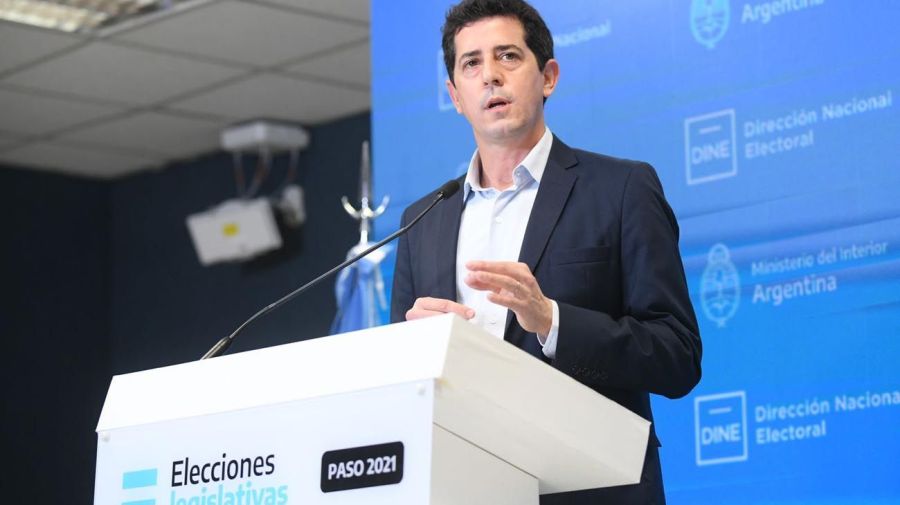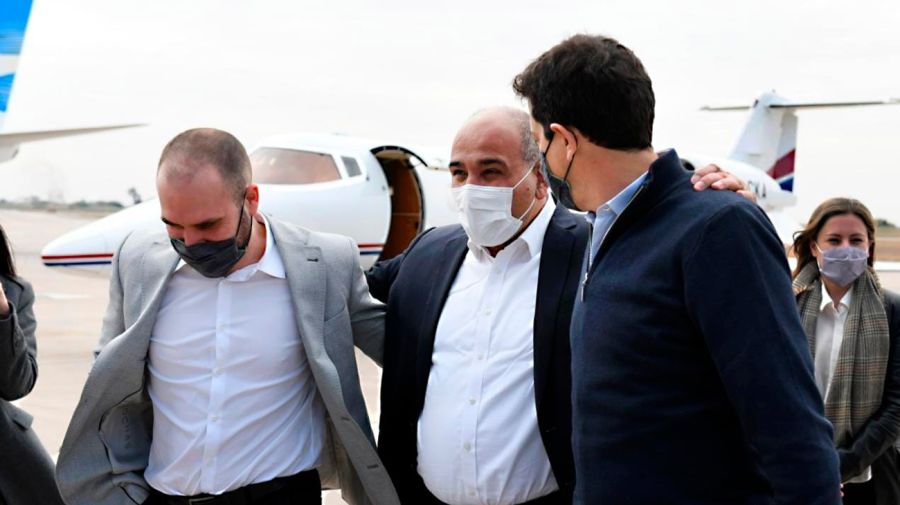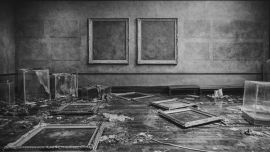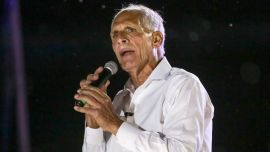Co-founder of La Cámpora, farmer and an architect of dialogue both within and beyond the ruling coalition, Interior Minister Eduardo ‘Wado’ de Pedro manifests his vision of a world which is multipolar politically and unipolar financially.
De Pedro, 45, maintains that the main challenge facing Peronism is growth with redistribution, placing his stakes on a federalism which creates jobs.
With emotion and his family history on his mind, he speaks of the process of the reconstruction of memory, truth and justice achieved in Argentina.
If you had to give a chat to political science students in San Andrés University to explain today’s world, what would you say?
I see a great dispute for natural resources. All the statistical data for population growth at global level lead you to think of subsistence with the world starting to divide between the countries which produce food, those with the capacity to buy it and those with the sovereignty to define what to do with their territory and natural resources. I do not see a dispute between the classic ideologies as we know them, such as the transformation of China, the transformation of the democracies and power between countries, which all has to do with technological innovations and the empowerment of society. At that point, without going too much into the international, I’d invite them to discuss the reordering of power.
So you definitely see a multipolar world.
I see a multipolar world but I still see a predominance of the financial system which is a worry today. When in Israel [recently] I met with their leaders such as the President, the deputy premier, the foreign and other ministers, while in Spain I talked to the main group of economists advising [premier] Pedro Sánchez, as well as officials from international organisations. Capitalism has already mutated at speeds which make diagnosis difficult in order to see how to resolve the problems. Back in 2019 [former Spanish premier] Felipe González was already worried about 70 percent of the world’s money being beyond the reach of taxation in tax havens. Yet not even the trickle-down discourse of greater economic growth reaching the rest of the population suffices because today’s money is laundered beyond the reach of international norms and taxation.
A politically multipolar and financially unipolar world.
Today yes, financially unipolar. But sovereign funds are also coming forth from Arab countries while China has a policy of creating links via financing. Today international links are also based on the need of countries for resources in order to be able to develop. And the dispute is over who aids which country in exchange for what.
Does Argentina face perhaps its best opportunity in a century, even better than the one favouring Néstor Kirchner from 2003 until the subprime crisis of 2008, with growing demand at sustained prices (and not just because of the war in Ukraine) for food, energy and minerals while at the same time with dollar inflation around 10 percent, the dollar debt shrinks year by year? Does the next government have the possibility of taking a leap which can be maintained for decades or not?
I see opportunities as Néstor and I saw them when he said that we have to part company with the International Monetary Fund (IMF) in order to have sovereignty for the future and be able to make the decisions which must be taken so that Argentina is able to develop and when I say develop, I mean jobs. Just growth is one thing. There are many countries which keep growing for 70 percent of the population but I don’t think that there are many politicians who defend growth with development, even if they might implement it when governing while everybody agrees in their discourse that growth has to come with distribution. And that has to do with broadening skills in society so that once you run out of your natural resources, your society continues progressing. That is what seems essential to me.
I see opportunities in oil, gas, fisheries, lithium and green energy. I do not like to speak of the past much but I see that the government before 2015, along with the level of debt reduction it achieved, had the strategic vision to recover YPF [oil company]. Let’s remember that all those in opposition today voted against the recovery of YPF, which has the Vaca Muerta shale deposits – without wishing to offend or criticise anybody. But think when we took many strategic decisions in order to be able to contemplate today an LNG [liquefied natural gas] plant in Río Negro or Buenos Aires provinces and in order to be able to continue the Néstor Kirchner gas pipeline from Vaca Muerta to Saliqueló and then to San Jerónimo [Santa Fe] in order to be able to export to Chile and to be able to keep producing beyond the needs of domestic consumption or supply. Some highly criticised decisions were taken first. It would be good if those critics could recognise that to society and be able to say: “I criticised the nationalisation of YPF but it was a really good move because today it gives us the possibility of negotiating with the world, of being able to begin not only to supply the domestic market but also to think of an LNG plant in order to be able to export gas and of a fertiliser plant. Let’s see if we cannot reach agreement with the farming sector – today Argentina imports 70 percent of its fertilisers, which are sold to those who produce the dollars.
We should explain to readers that you are a farmer.
Yes, so why can’t we make a 10-year plan? How much would it be worth to expand Pro Fértil whereby YPF partners a multinational to produce fertilisers on the basis of gas? We have the fourth-largest gas reserves in the world.
And the fourth in oil.
And the fourth in oil. Let’s plan how the sector, which requires inputs to produce more, can do that by launching a dialogue between the productive sector, YPF and the political system without falling for the government wanting to extract something from the sector. I believe that’s what’s missing.
Excuse the interruption but a fundamental need for development is reaching agreement with the opposition while the other is having sovereignty, the freedom to decide over one’s own resources. You said that among Néstor Kirchner’s strategic decisions was taking the IMF off monitoring Argentina so that would the IMF now be a problem for the sovereign development of that growth?
No, in 2015 there is a video of [former economy minister Nicolás] Dujovne – you can look for it in Internet – where he says with great surprise that Argentina has one of the lowest debt levels in the world as a percentage of gross domestic product as does the business sector, while family debt is five percent of what was produced annually, like no country in the world. A process reaching 2015 with that level of debt should have finished the negotiations with the vulture funds and then perhaps taken new debt for the strategic public works which Argentina needed. We knew that Vaca Muerta had that volume of gas for 174 years and oil for 100. Well, the investments into the northwestern and northeastern gas pipelines had to be made to keep developing Argentina, along with a fibre optics network, already thinking of 5G, as well as investing in satellites. The effort of Argentines not to use dollars or to use less dollars to travel abroad in order to reduce debt had nothing to do with screwing those who want to travel. It had to do with financing industries which needed inputs from abroad to be competitive and importing all the technologies not made in Argentina. That continuous effort had a future. We were thinking that for 2017-2018 and as from 2021, that the debt would be totally linked to the investments necessary for the private and public sectors to develop the country and to end that cyclical history of a government which reduces debt, followed by a government which runs up debt with capital flight. Remember that the Central Bank reserves left the country more than twice over. That financial bicycle which you and I had to pay for as businessmen, my generation and the generations of my children. Let us remember that 100-year bond at an interest rate of 8.9 percent.
So my point is that agreements must have objectives. Firstly, a diagnosis of how to industrialise Argentina. Are we all agreed? [Facundo] Manes, [Martín] Lousteau and [Patricia] Bullrich all agree with industrialisation, so let’s sit down and see what’s needed because we in Argentina all know that dollars are needed to industrialise. Fine, where do we get them? Because otherwise...

I repeat my question, does the existence of the IMF monitoring Argentina again prevent taking advantage of the country’s potential for development or not?
The existence of the IMF [deal] conditions economic sovereignty because we agreed on a plan negotiated with them which for some is good or very good and for others bad.
What do you have to say about the emergence and popularity of Javier Milei?
He’s a leader or politician who says what he thinks.
And what do you think of what he thinks?
Firstly, he has vindicated political activity by acting as a militant and leader. Saying what I think, I do not conceive...
So you value his involvement in politics.
I value everybody’s involvement. I do not value the discourse of hatred. I see the fantasy of attacking and eliminating others as dangerous to society, a fantasy typical of anti-Peronism to ban and batter Peronism, forbid mention of the name “Perón,” all those fantasies which only strengthened its identity. I said the same when Bullrich spoke of having to exterminate Kirchnerism. Such words seem to be a dangerous game.
Every absolutism is dangerous.
Totally.
I ask of you the same honesty which you highlight in Milei and Frente de Todos to talk of your electoral future. Carlos Ruckauf, an interior minister like yourself in the 1990s and later vice-president and Buenos Aires Province governor, has tipped a possible presidential ticket of you with [social leader Juan] Grabois as your running-mate. Last week in Tucumán Grabois said that you would be the best presidential candidate and he said it again, sincerely and without hypocrisy. If the conditions were right, is that something you would be prepared to do?
My personal history and militancy are known to everybody. Generally all decisions are discussed collectively. We understand that discussing and debating strategic decisions reduces the level of risk while gaining efficiency in the decision-making. When ideas are not discussed and debated and are more individual than collective, you have much more risk of going wrong.
We are not thinking of candidacies. We understand talking of candidacies today as a lack of respect towards a society just coming out of a pandemic which is witnessing a war between a food producer and an energy producer, which is what we eat and what we need. The times of society should be respected. As the interior minister, I know the electoral calendar with its dates of campaign and its deadlines for registering candidacies and political fronts. At the risk of being obvious, it seems to me that there is a long time to go and that’s not a decision which I’m going to take nor which depends on me.
To share something with readers, is it correct that you were once in jail with Grabois?
On December 20, 2001, we went out to protest against the corralito bank deposit freeze and the crisis alongside fatigue with a government which had promised certain transformations when it was the government which ended up being transformed, maintaining all the policies of hunger, unemployment, the destruction of national industry and trade, the corralito, the megacanje debt swap, the blindaje loans, etc. Many of us went out to protest that December 19 and 20.
So you were arrested at the same time but not together.
Sure, I was seized in Plaza de Mayo at 10.45am by a patrol car for going to defend the Mothers of Plaza de Mayo, who were being trampled by the horses of the Mounted Federal Police on the orders of the government. And Juan was also a Faculty militant who had recently organised a very interesting system of garbage collection for recovery and recycling at a time when nobody spoke of the environment. Juan already had a phenomenal network of workers excluded from the system who used the waste of others to recycle, add value and survive – a very interesting vision, work and struggle. And not only did they arrest a whole bunch of people but they murdered 31 young Argentines.
There is a whole generation which takes 2001 as a milestone. La Cámpora is an organisation of a generation. Does one generation think differently from another, even with the same ideology?
Yes, of course, because they are experiences and visions of the future. It’s also part of the energy and perspective which experience and planning the future give you.
La Cámpora, of which you are a co-founder, goes back, help me here, 15 or 20 years?
Yes, 16 years.
So it’s logical that people do not always think the same way in their 20s as in their 40s…
Máximo always says that this is the first time that a political youth grouping has been able to maintain itself throughout governments with an identity, after having shown the validity of its discussions. We’ve had the possibility to participate in a government in the last few years because the truth is that our position in the governments of Néstor and Cristina was to stay as far as possible from the state. We had never managed a social plan nor a cooperative until nowadays, always trying to be a genuine construction – we are the organisation with the most insertion in the middle class in Argentina. And we have had the good luck or the dynamics which have permitted us to keep on making a noise.
And how has age changed you 20 years after?
It’s not the age, it’s exercising policies which turn out well while policies which fail give you experience in opposition.
You were one of the first to present your resignation following the defeat in the PASO primaries. Did that change your relationship with the president?
I placed my resignation at his disposal. That’s an issue which we discussed with the president and, of course, it drove us apart for a while. Afterwards we met up again, I explained my reasons and today we have a very good relationship.
How does your vision differ from the president’s?
That had to do with the electoral strategy for 2021, with differences over how we approached the election and the campaign management of an election which ended up with results known to all.
Are you the senior representative of La Cámpora in the government?
Our political force was always Frente para la Victoria (“Victory Front”) which I represented until renamed Unidad Ciudadana (“Civic Unity”) in 2017. I represent what used to be Unidad Ciudadana.
The Senate has recently recovered Unidad Ciudadana as a party label. Do you feel yourself to be a representative of today’s Unidad Ciudadana too?
Today I feel myself to be a representative part of Frente de Todos. All my comrades of Frente de Todos represent me, the mayors and governors, and if I want to represent somebody, I want them all to feel represented.
Tell me with whatever ontology, taxonomy or categorical imperative you might prefer the characteristics which differentiate each component of Frente de Todos. What do Cristina Fernández de Kirchner and La Cámpora represent within Frente de Todos?
When he thought out the Frente de Todos, Máximo Kirchner – who was the one who worked out all the agreements with the rest of the political forces, with business sectors and trade unions – was saying with us: 'We can win an election with this line-up but in order to resolve the problems which Mauricio Macri and Cambiemos have left or will leave behind them, we’re going to need to broaden the coalition because majorities in Congress will be required and for that a level of consensus will be needed to resolve problems as structural as the debt issue and how they dismantled the state mechanisms to control evasion.'
That’s clear. The question was about classifying the different components of Frente de Todos to find the invariable element which explains why the essence of La Cámpora and Cristina Fernández de Kirchner differs from other components of Frente de Todos. Might being the most left wing not be enough for you?
It’s classical Peronism, classic Kirchnerism. The banners of social justice, political sovereignty and economic independence.
So you’re classifying it as Kirchnerite...
Peronism. Néstor Kirchner was saying...
That it lowered the price.
They call us Kirchnerites to lower our price because some powerful sectors always want to divide Peronism.

So if Cristina and La Cámpora are Peronism, what are Sergio Massa and Alberto Fernández?
Sergio Massa proclaims himself to be a Peronist. His Frente Renovador (“Renewal Front”) first emerged as a splinter of Peronism.
But how do you classify him? Is he a Peronist too?
He’s a Peronist with another vision of Peronism plus...
Very well. So is Alberto Fernández also a Peronist with another vision of Peronism?
He’s more of a social democrat.
That’s not good enough because the word “Peronism” is polysemous. Everything fits Peronism so we have to find another way of expressing ourselves didactically in order to understand. You used the word “calmer” to describe the government being sought in 2019. Do you represent a calmer mode within Kirchnerism?
I’d also like to have some qualities, I have no special qualities. I think that in politics quality is understanding what Argentina needs.
Your quality could be your character, Wado, the character with the essence of a human being beyond ideology. And character is a crucial element in politics.
But in politics we also need ideas, we need vision, we need planning and being able to carry it out. But I’m dodging your question, which I understand to be...
The logical thing would be each one of the coalitions trying to find a candidate to represent them but at the same time having characteristics which are not rejected by the other side because afterwards it will be necessary to govern.
We also have to stop thinking, as [1983-1989 Radical President Raúl] Alfonsín and Néstor said, that the [only] aim is to win an election.
So you continue with the idea that to govern you need agreements…
Over a bi-monetary economy, both the president and vice-president have been saying that inflation is a structural problem. Mauricio Macri said: ‘I’ll resolve it in five minutes, my government will be worthless if I have not resolved it in five minutes.’ We ended up with 50 percent. It’s structural so how do we resolve it?
No political party will be able to resolve the contraband on the Hidrovía waterway, the grain drain or the fight against drug-trafficking. If the state has structures with entrenched mafias, no government can and far less with this electoral system confronting you with an election every two years so that the dialogue to create a solution is too fast because in the second year no dialogue is permitted because there is an election.
And you’re the one who dialogues most in La Cámpora.
Máximo is very good at dialogue, he’s the one who created the consensus so that we can have a Frente de Todos government today.
He might be the best at dialogue within Frente de Todos, but evidently not with the sectors beyond because you make the contacts with the vested interests which Máximo Kirchner does not.
He makes them in private. I decided to go to Llao Llao, yesterday I was at the Universidad del Salvador and I’m going to AmCham. I like listening a lot. Primarily, I like listening to visions regarding what is needed of the state. We need a country which works and for that the state has to work, be smart and efficient with planning, generating agreements and consensus.
We’re reaching the end of the interview and I’d like to get personal. Since last year you decided to break your promise against speaking in public and began to give speeches to promote social awareness and sensitivity regarding stuttering and bullying. By the way you’ve been speaking for almost two hours perfectly, the jump from listening to you a year ago is huge. I’d like your message on this point.
Firstly, what I feel. I began because of a question of public duty. As my comrades were telling me, you have to speak because they’re going to start labelling you as an éminence grise. “But how?” I said, “if everybody knows…” “No,” they told me, “not everybody knows you have a difficulty. And while you don’t express that, the media construction will be made by others.” That was a big challenge.
You cannot not communicate, not communicating is also communicating.
Exactly.
Which holds true for La Cámpora.
Yes, that’s why I said it’s something we’re looking at. Firstly, I don’t want my name to be associated with anything I am not. As I’ve said, I prefer to pay the cost of mockery. The first reaction I received was mothers, fathers, teachers and phono-audiologists saying: “You have to carry on, we need an example for my child, my patient or my pupil.” First you see that nobody is perfect, that there is no perfect society, that what you see in the social networks or the advertising campaigns is a segment.
Were you surprised by the response you encountered?
I was surprised that I found a need in society for many people who are not perfect, with problems. Many kids after the pandemic with problems of communication, of links. Many families, each with their problems.
You not only represent speaking disability but any disability.
Exactly.
Is it also because of this that they began to see you as a candidate, that your resilience could be a metaphor for the resilience of many with much of society having had to endure every day an Argentina in decadence for the last 50 years?
I also began to see that society wants genuine things, that it already knows that not everything is perfect but they want to see that. They want representatives who are not perfect, journalists who are not perfect – they want to escape that permanent stereotype of perfect people because everything looks perfect on television.
We know that nobody is perfect but many countries have much more relaxed dynamics. You don’t have the advertising stereotype with the obligatory family prototype of white, blonde babies. There is an excess of marketing in consumer society. Fashion ends up with models weighing 45 kilos and then adolescents have eating disorders and serious health problems. And that all started with brands of clothing for normal people, with models very much like what you see in society. Politics is very similar to society.
What does it mean to you that your parents were killed? What does that leave? How do you process that and what message can you leave for others with other kinds of losses?
Politically it’s...
You don’t hate.
No, not at all. Politically it is a message which gives an energy so that it never happens again, that nobody suffers what we did. Personally, an empathy and a care for society and a level of responsibility which leaves you very alert to discourses and fighting so that their dynamics do not escalate and end up in…
Let us remember that social processes begin with a leader, with a discourse of hatred singling out what is different and then perhaps ending in slaughter. For me the lesson is to look after Argentine society. That’s my responsibility when I speak and listen. That what happened to me never happens again. Let us look after our Argentina....
Just telling that has made you emotional in just a few seconds.
You always carry it inside.
Production: Sol Bacigalupo and Natalia Gelfman.


















Comments